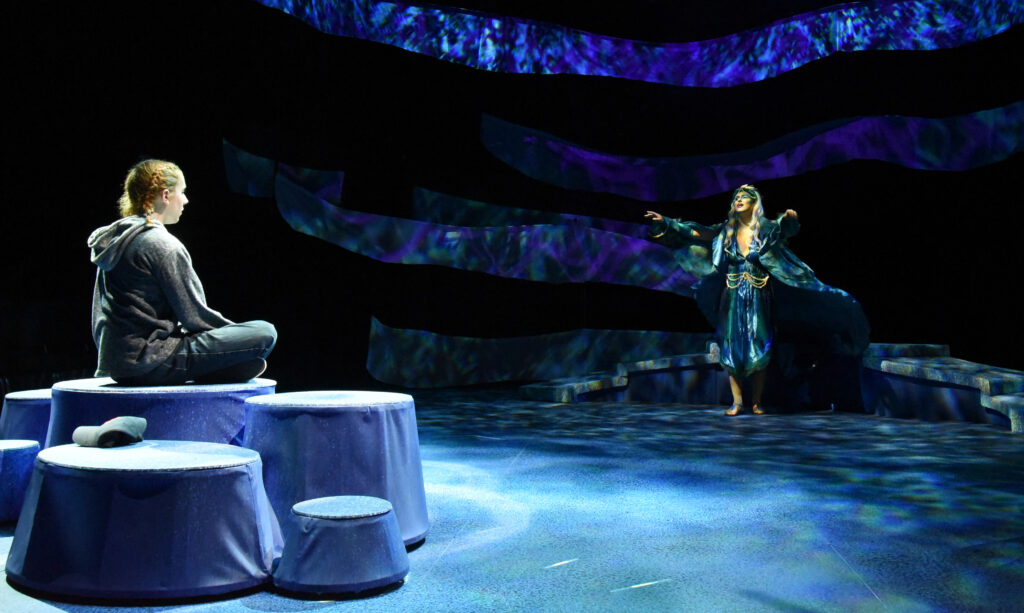
Photo by Molly Shoemaker.
Presented by Moonbox Productions
Play by David Valdes
Direction by Bridget Kathleen O’Leary
Scenic Design by Janie E. Howland
Lighting Design by Deb Sullivan
Costume Design by E Rosser
Composition by Kai Bohlman
Sound Design by Kai Bohlman and Anna Drummond
Dramaturgy by Wenxuan Xue
Featuring: Brenny O’Brien, Phil Tayler, Monica Risi, Alex Goldman, Clara Tan
April 26 – May 19
Arrow Street Arts
2 Arrow St, Cambridge, MA 02138
Tickets here
Article by Maegan Bergeron-Clearwood
Content advisory for transphobic language such as misgendering, as well as mature content such as swearing, references to anatomy, and sexual activity. Recommended for ages 12 and up.
CAMBRIDGE, Mass. — In the early 2010s, when Mermaid Hour was written, trans visibility was on the rise and Internet discourse was largely concerned with pronouns and representation. In David Valdes’ play, Pilar and David are searching for information about terminology and puberty blockers to support their trans daughter, Vi. Their efforts are earnest; they make mistakes; then they learn and adjust and move on. They love their kid, and that’s enough.
Had Mermaid Hour been written today, Pilar and Bird’s journey would likely feel more desperate. In the last decade, the political landscape has shifted in demonstrably terrifying, material ways, as anti-trans legislation threatens the wellbeing and lives of trans teens across the country, and queer youth are at despairingly high risk for self-harm and suicide. Transphobia was present in 2010, but in 2024, it’s being codified in such a way that Mermaid Hour – a play about family, not systems of power – feels almost surreally low stakes.
Of course, there is still the need for stories about queer kids and the families who support them, and this production is hardly apolitical. Pilar and Bird are already working overtime to put food on their table, only to learn that Vi’s healthcare needs won’t be covered by their insurance, a harsh reflection of real-world trans discrimination. Moonbox Productions is partnering with the Transgender Emergency Fund of Massachusetts, an organization that provides “critical assistance to low-income trans and gender nonconforming people” through housing, food, and healthcare assistance.
Thanks to earnest performances from the cast, there’s never a doubt that the characters in this play love each other. Pilar and Bird flounder while navigating this new world of puberty blockers and pronouns, but Monica Risi and Phil Tayler bring a sensitivity and nuance that ground the production in love. Brenny O’Brien as Vi brings a particularly impassioned performance, fuming with adolescent angst as she tries to hold her own in a world that refuses to see her as she truly is.
The play’s title derives from Vi’s favorite mermaid-themed, queer-positive YouTube channel, a digital world that frequently bleeds into the domestic sphere, and director Bridget Kathleen O’Leary leans into this magical realism. Scenic Designer Janie E. Howland and Lighting Designer Deb Sullivan have constructed an underwater dreamscape: blue and turquoise waves frame the playing space, sunlight streams in from the surface, and the family’s living room furniture floats from the ceiling as if their everyday domestic life has literally exploded in favor of Vi’s tranquil fantasy land. The transitions between the two worlds are abrupt, and the realist scenes sometimes struggle to articulate meaning in this unspecified watery world, but the overall effect is enchanting.

Photo by Molly Shoemaker.
Vi’s utopic, queer, underwater dreamworld is the production’s aesthetic homebase, but Mermaid Hour is not her story. Pilar and Bird are the audience’s viewpoint; their missteps, ignorance, confusion, and despair in the face of unprecedented parenting challenges are meant to be sympathized with. And while that perspective is worthy of exploration, it is often hard to watch.
Both parents struggle to let go of their personal imaginings of who Vi should be and embrace the person that Vi is, with mixed success. Pilar’s enthusiastic support of Vi’s transition stands in contrast with her husband’s gruff traditionalism, but her resolve is shaken when she learns that pronoun blockers and hormonal treatment will leave her infertile.
(This is a notable misconception about trans healthcare: HRT’s effects on fertility are not as cut-and-dry as indicated in the play, and plenty of trans people can and do have children. This oversimplification is frequently cited in anti-trans propaganda, and while it’s an understandable plot point for a play written in the early 2010s – when reliable information about trans healthcare was less available – today, as myths about trans people are being weaponized against them, it is worth clarifying).
Bird’s (Phil Tayler) journey is especially challenging. In a monologue that serves as the play’s emotional crescendo, Bird — your typical hypermasculine, Red Sox-loving dad – recounts his despair (and even rage) at what he sees as losing the son he so desperately wanted. It’s a raw, utterly human outpouring of grief, but it’s also ugly; Tayler’s performance is almost too vulnerable, as he recalls harmful language and behaviors that his character regrets but doesn’t necessarily hold himself accountable for.
This is a play for grownups who have queer kids in their lives. It’s sympathetic to that perspective and informative about how to navigate the journey. For anyone in Vi’s position – anyone who has faced pushback or ignorance from loved ones in their quest to become their trust self – this production may be hard to watch.
Mermaid Hour is full of love, but at the end of the day, love is not enough. Today, especially, the standards are higher because the stakes are higher. Love is just the start: queer kids also need empathy, advocacy, and accountability from the grown-ups in their lives. The parents in Mermaid Hour are getting there – I just wish the play pushed them a little harder.
